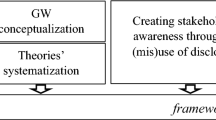Abstract
The purpose of socially responsible investing (SRI) is to: (1) allow investors to reflect their personal values and ethics in their choices, and (2) encourage companies to improve their ethical, social, and environmental performance. In order to achieve these ends, the means SRI fund managers employ include the use of negative screening, or the exclusion of companies involved in “sinful” industries. We argue that there are problems with this methodology, both at a theoretical and at a practical level. As a consequence, current SRI offerings cannot accurately reflect the values and ethical beliefs they propose to represent. Moreover, the use of a␣priori criteria is potentially misleading, as we show by discussing examples of glue and wine making. Applying this flawed approach SRI funds fail to influence the direction of the firms they deem most in need of re-directing. Rather than engaging in the simple a␣priori assumption that some industries are “saints” while others are “sinners” (Freeman, 2007) we suggest a new framework upon which the SRI screening methodology could be grounded. Embracing the philosophical tradition of American pragmatism, we suggest that SRI methodology could be improved by engaging in an analysis based on (1) the actual impacts of the company’s products and services, (2) the company’s relationships with its specific, real stakeholders, and (3) the contingent environment (social, economic, political, legal, and cultural) in which the business operates.
Similar content being viewed by others
References
Dewey, J. (1927), The Public and Its Problems. Ohio University Press, Ohio.
Donaldson, T, P. Werhane and M. Cording. 2002. Ethical Issues in Business. A Philosophical Approach, 7th edition, Prentice Hall, Englewood Cliffs
Freeman, E. R.: 2007. ‹Building an Ethical America’, Society for Business Ethics Annual Meeting, Philadelphia, PA
Gay, G. R. and J. A. Klaassen: 2005, ‹Retirement Investment, Fiduciary Obligations, and Socially Responsible Investing’, Journal of Deferred Compensation␣10(4) (summer 2005): 34–40
Hawken, P.: 2004. Socially Responsible Investing: How the SRI Industry has Failed to Respond to People Who Want to Invest with Conscience and What can be Done to Change It (Natural Capital Institute)
Laufer, W. S. 2003. Social screening of investments: An introduction. Journal of Business Ethics, 43(3): 163–165.
McVea, J. F. and R. E. Freeman: 2005, ‹A Names-and-Faces Approach to Stakeholder Management’, Journal of Management Inquiry 14(1), 57–69
PaxWorld: 2007, http://www.paxworld.com/about/pax-history/
Putnam, H. 2004. The Collapse of the Fact/Value Dichotomy and Other Essays. Cambridge: Harvard University Press.
Rajotte, P. 1992. Belgian Ale. Boulder, CO: Brewers Publications.
Rorty, R.: 1991, Objectivity, Relativism, and Truth: Philosophical Papers, Vol. 1 (Cambridge University Press, Cambridge)
Schepers, D. H. and S. P. Sethi: 2003, ‹Do Socially Responsible Investing Funds Actually Deliver What They Promise?’, Business and Society Review 108(1), 11–32
Schwartz, M. S. 2003. The “ethics” of ethical investing. Journal of Business Ethics, 43(3): 195–00.
Social Investment Forum: 2004. Talking Points: Paul Hawken Article on Socially Responsible Investing (Social Investment Forum)
Social Investment Forum: 2007. Socially Responsible Investing Facts
Social Investment Forum Industry Research Program: 2006. 2005 Report on Socially Responsible Investing Trends in the United States: 10-Year Review
Willis, A. 2003. The role of the global reporting initiative’s sustainability reporting guidelines in the social screening of investments. Journal of Business Ethics, 43(3): 233–237.
World Health Organization: 2004, ‹Global Status Report on Alcohol 2004’, http://www.mondovinofilm.com, http://www.pbs.org/wgbh/pages/frontline/shows/porn/
www.newbelgium.com, 2007
www.sugarleaf.com, 2007
Acknowledgment
Both authors are grateful to Pat Werhane for her support and inspiration to originate this research, and to Andy Wicks, Harry Hummels, Davide Dal Maso and two anonymous SBE reviewers for their thoughtful comments on early drafts. Jeffrey G. York would like to gratefully acknowledge the support of the Batten Institute at the Darden Graduate School of Business in conducting this research. Simone de Colle would like to thank the Olsson Center for Applied Ethics at the Darden Graduate School of Business for supporting his research.
Author information
Authors and Affiliations
Corresponding author
Rights and permissions
About this article
Cite this article
de Colle, S., York, J.G. Why Wine is not Glue? The Unresolved Problem of Negative Screening in Socially Responsible Investing. J Bus Ethics 85 (Suppl 1), 83–95 (2009). https://doi.org/10.1007/s10551-008-9949-z
Published:
Issue Date:
DOI: https://doi.org/10.1007/s10551-008-9949-z




